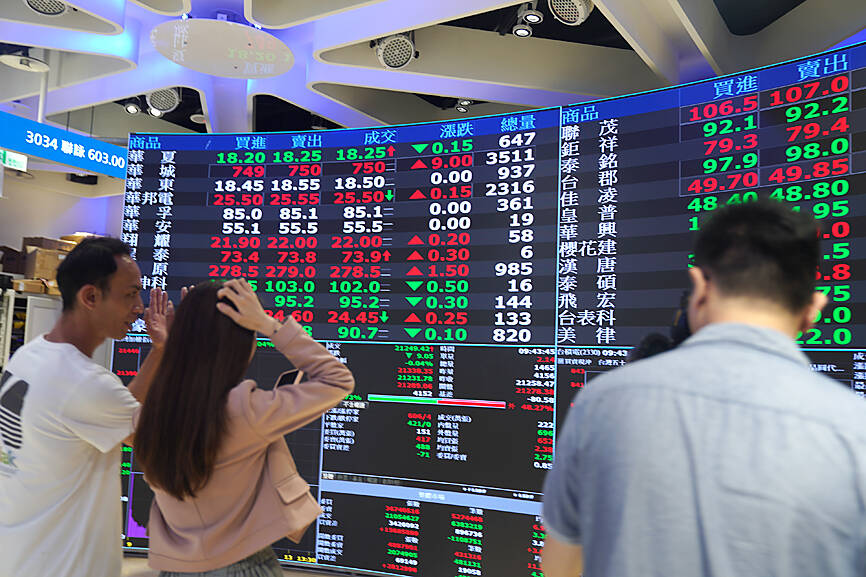The Financial Supervisory Commission (FSC) yesterday announced temporary response measures to help maintain stock market stability, while safeguarding the interests of Taiwanese investors and listed companies.
In the face of potential market turmoil from US President Donald Trump’s “reciprocal” tariffs announced last week, the commission said it would impose temporary curbs on short selling shares and other measures to reduce potential volatility.
The new measures take effect today and last through Friday, the FSC said in a statement.

Photo: CNA
Short selling is when investors borrow securities, typically from brokerages, and sell them, expecting the price to fall so they can make a profit by buying them back at a lower price later.
Expecting Trump’s tariffs to create shocks in the local stock market following an extended holiday weekend, the commission said it would limit the number of shares that can be sold short, the statement said.
Starting today, the volume of intraday securities lending to short sell a stock is to be lowered to 3 percent of the stock’s average daily trading volume over the previous 30 sessions, down from 30 percent, the commission said.
In addition, the amount of money an investor must deposit to borrow securities is to be raised to 130 percent of a stock’s value from 90 percent, it said, underlying the commission’s intention to effectively increase the cost of short selling.
The FSC would also allow investors to use municipal means as collateral, as long as they have market liquidity and can be objectively and reasonably assessed, allowing investors to make up the margin shortfall in margin trading or short selling, it added.
The commission said it would continue to monitor changes in the international financial situation and domestic capital market conditions, and adjust measures in a timely manner.

US President Donald Trump yesterday announced sweeping "reciprocal tariffs" on US trading partners, including a 32 percent tax on goods from Taiwan that is set to take effect on Wednesday. At a Rose Garden event, Trump declared a 10 percent baseline tax on imports from all countries, with the White House saying it would take effect on Saturday. Countries with larger trade surpluses with the US would face higher duties beginning on Wednesday, including Taiwan (32 percent), China (34 percent), Japan (24 percent), South Korea (25 percent), Vietnam (46 percent) and Thailand (36 percent). Canada and Mexico, the two largest US trading

China's military today said it began joint army, navy and rocket force exercises around Taiwan to "serve as a stern warning and powerful deterrent against Taiwanese independence," calling President William Lai (賴清德) a "parasite." The exercises come after Lai called Beijing a "foreign hostile force" last month. More than 10 Chinese military ships approached close to Taiwan's 24 nautical mile (44.4km) contiguous zone this morning and Taiwan sent its own warships to respond, two senior Taiwanese officials said. Taiwan has not yet detected any live fire by the Chinese military so far, one of the officials said. The drills took place after US Secretary

ACTION PLAN: Taiwan would expand procurement from the US and encourage more companies to invest in the US to deepen bilateral cooperation, Lai said The government would not impose reciprocal tariffs in retaliation against US levies, President William Lai (賴清德) said yesterday, as he announced five strategies to address the issue, including pledging to increase Taiwanese companies’ investments in the US. Lai has in the past few days met with administrative and national security officials, as well as representatives from various industries, to explore countermeasures after US President Donald Trump on Wednesday last week announced a 32 percent duty on Taiwanese imports. In a video released yesterday evening, Lai said that Taiwan would not retaliate against the US with higher tariffs and Taiwanese companies’ commitments to

CHIP EXCEPTION: An official said that an exception for Taiwanese semiconductors would have a limited effect, as most are packaged in third nations before being sold The Executive Yuan yesterday decried US President Donald Trump’s 32 percent tariff on Taiwanese goods announced hours earlier as “unfair,” saying it would lodge a representation with Washington. The Cabinet in a statement described the pledged US tariffs, expected to take effect on Wednesday next week, as “deeply unreasonable” and “highly regrettable.” Cabinet spokeswoman Michelle Lee (李慧芝) said that the government would “lodge a solemn representation” with the US Trade Representative and continue negotiating with Washington to “ensure the interests of our nation and industries.” Trump at a news conference in Washington on Wednesday announced a 10 percent baseline tariff on most goods